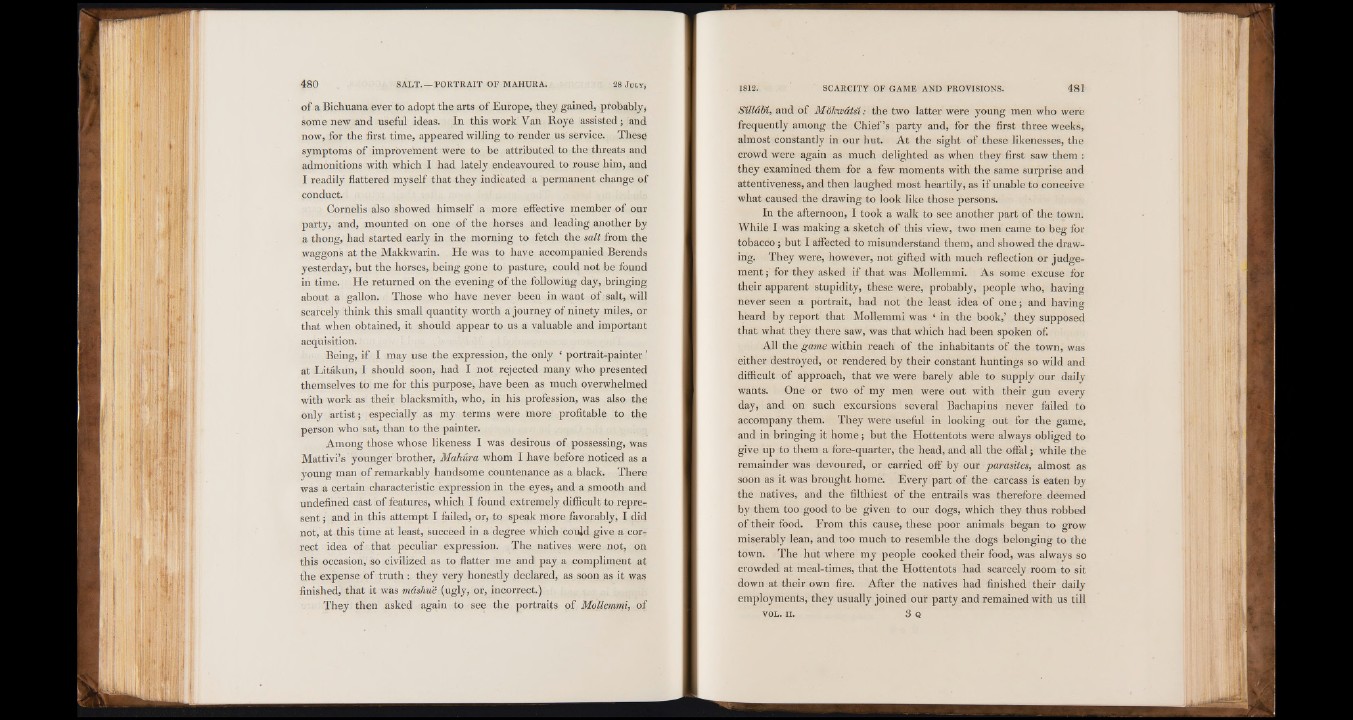
of a Bichuana ever to adopt the arts of Europe, they gained, probably j
some new and useful ideas. In this work Van Roye assisted; and
now, for the first time, appeared willing to render us service. These
symptoms of improvement were to be attributed to the threats and
admonitions with which I had lately endeavoured to rouse him, and
I readily flattered myself that they indicated a permanent change of
conduct.
Cornelis also showed himself a more eifective member of our
party, and, mounted on one of the horses and leading another by
a thong, had started early in the morning to fetch the salt from the
waggons at the Makkwarin. He was to have accompanied Berends
yesterday, but the horses, being gone to pasture, could not be found
in time. He returned on the evening of the following day, bringing
about a gallon. Those who have never been in want of salt, will
scarcely think this small quantity worth a journey of ninety miles, or
that when obtained, it should appear to us a valuable and important
acquisition.
Being, if I may use the expression, the only j portrait-painter ’
at Litakun, I should soon, had I not rejected many who presented
themselves to me for this purpose, have been as much overwhelmed
with work as their blacksmith, who, in his profession, was also the
only artist; especially as my terms were more profitable to the
person who sat, than to the painter.
Among those whose likeness I was desirous of possessing, was
Mattivi’s younger brother, Mahura whom I have before noticed as a
young man of remarkably handsome countenance as a black. There
was a certain characteristic expression in the eyes, and a smooth and
undefined cast of features, which I found extremely difficult to represent
; and in this attempt I failed, or, to speak more favorably, I did
not, at this time at least, succeed in a degree which could give a correct
idea of that peculiar expression. The natives were not, on
this occasion, so civilized as to flatter me and pay a compliment at
the expense of truth : they very honestly declared, as soon as it was
finished, that it was mashue (ugly, or, incorrect.)
They then asked again to see the portraits of Mollemmi, of
Sil/d/n, and of MSkwatsi: the two latter were young men who were
frequently among the Chief’s party and, for the first three weeks,
almost constantly in our hut. At the sight of these likenesses, the
crowd were again as much delighted as when they first saw them :
they examined them for a few moments with the same surprise and
attentiveness, and then laughed most heartily, as if unable to conceive
what caused the drawing to look like those persons.
In the afternoon, I took a walk to see another part of the town.
While I was making a sketch of this view, two men came to beg for
tobacco ; but I affected to misunderstand them, and showed the drawings
They were, however, not gifted with much reflection or judgement
; for they asked if that was Mollemmi. As some excuse for
their apparent stupidity, these were, probably, people who, having
never seen a portrait, had not the least idea of one; and having
heard by report that Mollemmi was ‘ in the book,’ they supposed
that what they there saw, was that which had been spo.ken of.
All the game within reach of the inhabitants of the town, was
either destroyed, or rendered by their constant huntings so wild and
difficult of approach, that we were barely able to supply our daily
wants. One or two of my men were out with their gun every
day, and on such excursions several Bachapins never failed to
accompany them. They were useful in looking out for the game,
and in bringing it home ; but the Hottentots were always obliged to
give up to them a fore-quarter, the head, and all the offal; while the
remainder was devoured, or carried off by our parasites, almost as
soon as it was brought home. Every part of the carcass is eaten by
the natives, and the filthiest of the entrails was therefore deemed
by them too good to be given to our dogs, which they thus robbed
of their food. From this cause, these poor animals began to grow
miserably lean, and too much to resemble the dogs belonging to the
town. The hut where my people cooked their food, was always so
crowded at meal-times, that the Hottentots had scarcely room to sit
down at their own fire. After the natives had finished their daily
employments, they usually joined our party and remained with us till
VOL. II. 3 Q